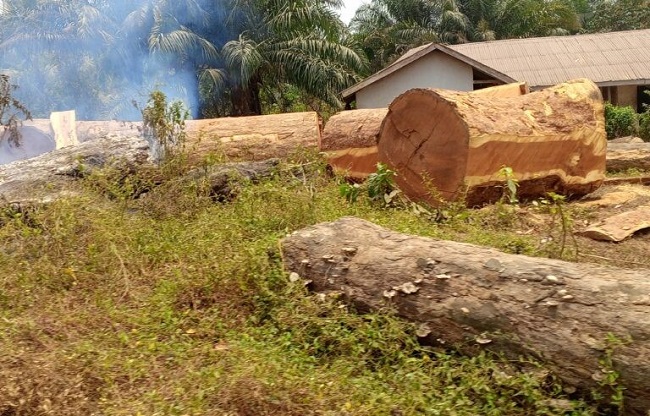Nigeria is home to some of Africa’s most diverse and exceptional habitats, ranging from the tropical rainforests of the Niger Delta to its expansive mangrove swamps and northern savannas.

According to the National Strategy for Combating Wildlife and Forestry Crimes in Nigeria (2022–2026), these habitats host some of the rarest species in human history.
The country boasts of an impressive array of biodiversity, including 285 mammals, 864 bird species, 203 reptiles, 775 types of fish, and over 4,715 plant species.
Notably, Nigeria’s mangrove forest, the third largest globally, stretches into Cameroon and Equatorial Guinea, covering one million hectares out of Africa’s 3.2 million hectares of mangrove forests.
It stands as one of the world’s critical biodiversity hotspots.
In recognition of this rich natural heritage, Nigeria established eight National Parks and 15 Forest Reserves.
They are the Chad Basin, Cross River, Gashaka Gumti, Kainji, Kamuku, Okomu, Old Oyo, and Yankari National Parks.
Among these, the Cross River National Park holds particular significance.
The Cross River National Park, established in two phases; the Oban section in 1988 and the Okwangwo section in 1991, spans around 4,000 square kilometres of rainforests and mangrove swamps.
It is the largest rainforest in Nigeria and among the oldest in Africa, harbouring approximately 16 primate species.
However, like many of Nigeria’s conservation initiatives, the park faces severe threats.
Illegal logging, mining, poaching, farming, and a relentless appetite for bushmeat have drastically depleted its flora and fauna.
In spite of numerous laws and initiatives at both federal and state levels, the destruction continues unabated.
In 1991, Cross River’s total forest cover was approximately 7,930 square kilometres, representing 34.3 per cent of the state’s surface area.
By 2008, this figure had dropped to 6,102 square kilometres, covering just 28.68 per cent of the state. The annual deforestation rate has since intensified, driven by multiple factors.
To address this, Cross River State enacted the Forestry Commission Law of 2010, establishing a Forestry Commission to promote sustainable forest and wildlife management.
The law explicitly prohibits clear-cutting or burning high forest lands in protected areas for agricultural or other purposes without written permission.
Violators are subject to penalties, including payment of fees and royalties for damaged forest produce.
Yet, environmentalists argue that while such laws look commendable on paper, they have yielded little practical success.
Politicians, influential individuals, foreign nationals, and neighbouring communities have been implicated as major culprits in the ongoing forest depletion.
A conservationist, Ms Elizabeth Gadsby, notes that Nigeria possesses one of the highest levels of biodiversity in Africa.
Using primates as an indicator, Nigeria ranks third on the continent, after the Democratic Republic of Congo and Cameroon.
Yet, the country’s biodiversity is rapidly declining.
“Nigeria has already lost about 96 per cent of its forests. We have lost cheetahs, giraffes, and black rhinoceroses, among other iconic species.
Today, leopards, hippos, and African wild dogs are extinct in Nigeria,” Gadsby lamented.
A cultural preference for bushmeat exacerbates the crisis.
While the practice itself is not inherently problematic, the absence of regulation has pushed several species to the brink of extinction.
“In places like the United States, hunting is regulated and requires a licence. In Nigeria, however, hunting has long been driven by commercial motives,” Gadsby added.
A visit to Atimbo, a popular bushmeat hub near Calabar, revealed stalls selling various animal meats, including antelope, porcupine, and warthog, often paired with palm wine.
According to a trader, Mrs Abigail Essien, business is brisk, especially on weekends, with supplies coming from hunters via intermediaries.
Mr Peter Jenkins Jr., another conservationist, noted Nigeria’s strong environmental laws, which are poorly enforced.
“With a growing population, forests are being destroyed at an alarming rate. Illegal mining, logging, and hunting in protected areas will eventually leave nothing behind if unchecked,” he warned.
Efforts to combat these issues are further hampered by funding and logistical challenges.
The Chairman of Cross River’s Forestry Commission, Mr George Oben-Etchi, cited inadequate funding, insufficient manpower, and a lack of vehicles for forest patrols.
Similarly, CP Caroline Olori, the Conservator of Cross River National Park, noted a lack of cooperation from local communities, who often invite outsiders for illegal activities in exchange for minimal compensation.
Despite these challenges, organisations like Drill Ranch continue to play a vital role in protecting Nigeria’s wildlife.
Recently, in collaboration with the World Parrot Trust and other stakeholders, Drill Ranch facilitated the release of 25 African grey parrots rescued from traffickers.
Climate change adds another layer of urgency to conservation efforts.
In Cross River, temperatures have risen steadily over the past 25 years, with increasingly erratic weather patterns.
Experts warn that without immediate intervention, the situation will deteriorate further.
The decline of Cross River National Park underscores the inadequacy of laws without effective enforcement.
To safeguard Nigeria’s unique natural habitats, stakeholders must strengthen the management of protected areas through robust financial, technical, and political support.
Many say combating poaching, illegal logging, and other destructive activities requires collective action and unwavering commitment.
Without decisive measures, the rich biodiversity of Nigeria’s forests may become little more than a memory.
By Christian Njoku, News Agency of Nigeria (NAN)
